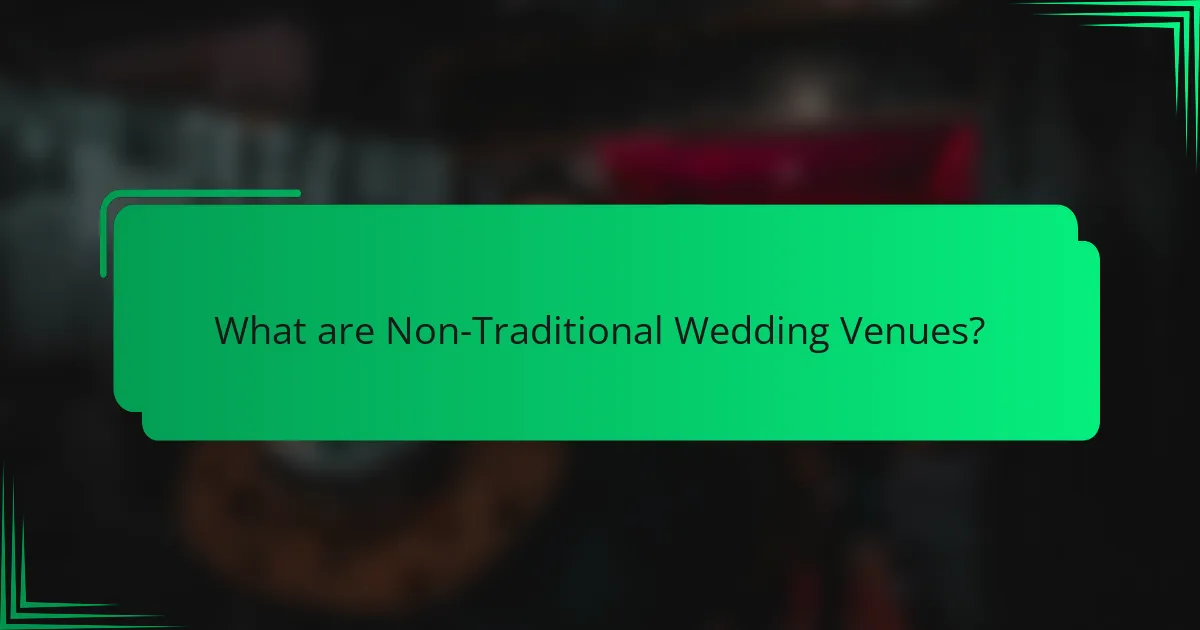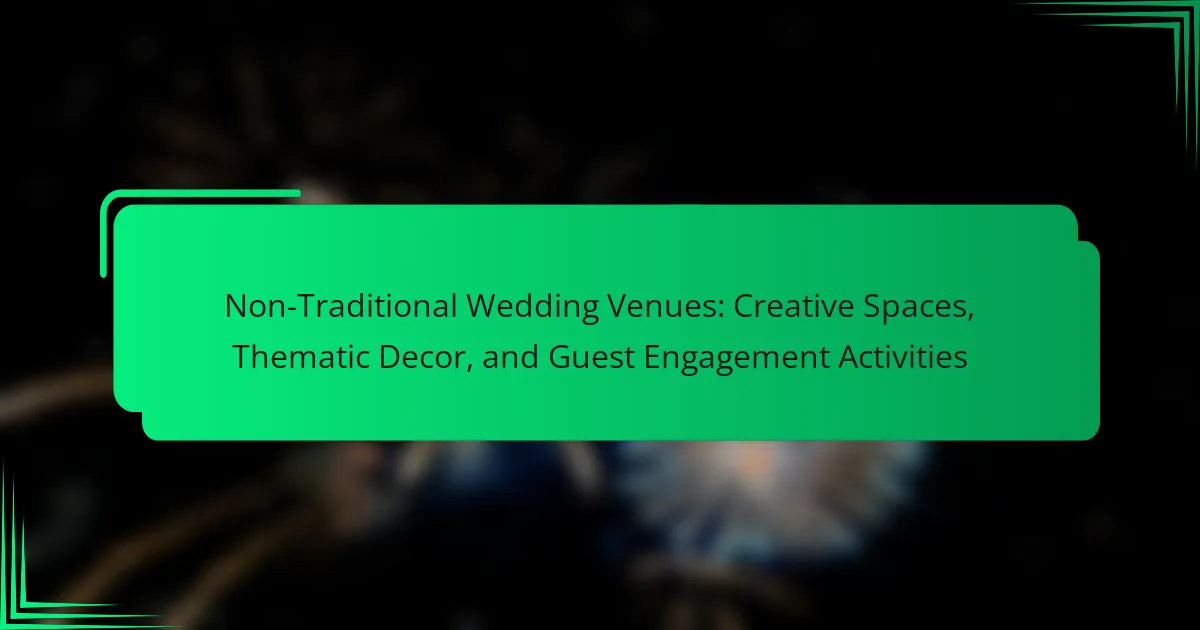Non-traditional wedding venues are unique locations that differ from standard options such as churches or banquet halls, including art galleries, barns, museums, and rooftop terraces. These venues enable couples to showcase their personalities and themes through distinctive backdrops and atmospheres, accommodating various guest sizes and styles. A recent survey by The Knot indicates that 24% of couples have chosen non-traditional venues, highlighting a trend towards personalized and memorable wedding experiences. The article will explore creative spaces, thematic decor, and engaging activities that enhance the wedding experience in these unconventional settings.

What are Non-Traditional Wedding Venues?
Non-traditional wedding venues are locations that deviate from conventional settings like churches or banquet halls. Examples include art galleries, barns, museums, and rooftop terraces. These venues often provide unique backdrops and atmospheres for weddings. They allow couples to express their personalities and themes creatively. Non-traditional venues can accommodate various guest sizes and styles. Many couples choose these spaces for their distinct aesthetics and experiences. According to a survey by The Knot, 24% of couples opted for non-traditional venues in recent years. This trend reflects a growing desire for personalized and memorable wedding experiences.
How do Non-Traditional Wedding Venues differ from Traditional Venues?
Non-traditional wedding venues differ from traditional venues primarily in their unique settings and flexibility. Traditional venues, such as churches or banquet halls, often have established formats and restrictions. Non-traditional venues can include places like barns, museums, or outdoor parks. They typically offer customizable layouts and themes. This flexibility allows couples to personalize their weddings extensively. Non-traditional venues often provide unique backdrops that enhance photography and guest experiences. A study by WeddingWire in 2020 noted that 30% of couples chose non-traditional venues for their distinctive character.
What types of Non-Traditional Wedding Venues are available?
Non-traditional wedding venues include unique spaces that diverge from traditional sites. Examples are barns, warehouses, and art galleries. Other options are botanical gardens, museums, and rooftop terraces. Additionally, some couples choose to host weddings at private homes or vacation rentals. Each venue provides a distinct atmosphere and aesthetic. These spaces often allow for personalized themes and decor. Non-traditional venues also cater to various guest engagement activities. Many couples find that these venues enhance the overall experience of the wedding.
Why choose a Non-Traditional Wedding Venue?
Choosing a non-traditional wedding venue allows for unique and personalized experiences. These venues often offer distinctive aesthetics that reflect the couple’s personality. Non-traditional spaces can include art galleries, barns, or even rooftops. They provide opportunities for creative decor and themes that traditional venues may not allow. Additionally, non-traditional venues often have more flexible layouts. This flexibility can enhance guest engagement and interaction. According to a survey by The Knot, 30% of couples opt for unique venues to create memorable experiences. This trend reflects a growing desire for personalization in weddings.
What creative spaces can be used for Non-Traditional Weddings?
Unique venues for non-traditional weddings include art galleries, botanical gardens, and historic libraries. Art galleries offer a vibrant backdrop with diverse artwork. Botanical gardens provide a natural setting filled with flowers and greenery. Historic libraries create an intimate atmosphere with rich architecture. Other options are warehouses, breweries, and rooftop terraces. Warehouses can be transformed with unique decor. Breweries allow for a casual, relaxed vibe. Rooftop terraces offer stunning views and an open-air experience. Each venue type supports personalized themes and creative decor.
How can unique locations enhance the wedding experience?
Unique locations can significantly enhance the wedding experience by providing a memorable backdrop. These settings create a distinct atmosphere that reflects the couple’s personality. For example, a beach wedding offers natural beauty and a relaxed vibe. Unique venues often provide opportunities for creative decor that aligns with the location’s theme. This enhances visual appeal and guest engagement. Studies indicate that unique settings can improve guest satisfaction and enjoyment. According to a survey by The Knot, 87% of couples believe venue choice impacts their wedding’s overall success. Unique locations can also facilitate personalized experiences, making the event more meaningful.
What are some examples of popular creative spaces for weddings?
Popular creative spaces for weddings include barns, art galleries, and rooftop venues. Barns offer rustic charm and often have large open spaces. Art galleries provide a sophisticated backdrop with unique artwork. Rooftop venues offer stunning views and an urban atmosphere. Other options include botanical gardens, which create a natural setting with vibrant flowers. Historic homes can add elegance and character to the event. Each of these spaces allows for personalized decor and thematic elements, enhancing the wedding experience.
What thematic decor options are available for Non-Traditional Weddings?
Non-traditional weddings offer diverse thematic decor options. Popular themes include rustic charm, bohemian elegance, and vintage glamour. Rustic decor often features wooden elements, wildflowers, and burlap accents. Bohemian themes embrace vibrant colors, eclectic patterns, and natural materials. Vintage glamour incorporates antique furniture, lace details, and soft, muted color palettes. Other options include industrial chic, with exposed brick and metal fixtures, and whimsical themes, featuring fairy lights and playful decor. Each theme allows for personalization, reflecting the couple’s unique style and story.
How do themes influence decor choices in Non-Traditional Venues?
Themes significantly influence decor choices in non-traditional venues. They guide the selection of colors, materials, and overall ambiance. A vintage theme may lead to the use of lace, muted colors, and antique furnishings. In contrast, a modern theme might favor sleek lines, bold colors, and minimalist decor. Themes also dictate the arrangement of space, affecting seating layouts and focal points. For example, a rustic theme often incorporates natural elements like wood and greenery. This alignment enhances the guest experience by creating a cohesive environment. Ultimately, themes ensure that decor resonates with the event’s purpose and the couple’s vision.
What are some trending themes for Non-Traditional Weddings?
Some trending themes for non-traditional weddings include rustic charm, bohemian vibes, and vintage elegance. Rustic charm often features natural materials, such as wood and burlap, creating a cozy atmosphere. Bohemian vibes emphasize free-spirited elements, incorporating vibrant colors and eclectic decor. Vintage elegance focuses on classic styles, using antiques and retro elements for a nostalgic feel. Other popular themes include garden parties, industrial chic, and destination weddings. Each theme allows couples to express their unique personalities and preferences. These themes are gaining popularity as couples seek personalized experiences that reflect their values and interests.
How can guest engagement activities enhance a Non-Traditional Wedding?
Guest engagement activities can significantly enhance a Non-Traditional Wedding by fostering a sense of community among attendees. These activities encourage interaction, making guests feel more involved in the celebration. For instance, interactive games or DIY stations can break the ice and stimulate conversations.
Moreover, personalized experiences, such as custom photo booths or unique entertainment, create memorable moments. According to a study by The Knot, 80% of couples reported that personalized wedding experiences improved guest satisfaction.
Additionally, incorporating cultural or thematic elements into activities can resonate with guests, making the event more meaningful. This approach not only entertains but also educates attendees about the couple’s background or interests. Overall, guest engagement activities transform a Non-Traditional Wedding into a more dynamic and enjoyable experience for everyone involved.
What types of activities can be included to engage guests?
Engaging guests at non-traditional wedding venues can include interactive activities. These activities foster participation and create memorable experiences. Options include photo booths with props, allowing guests to capture fun moments. Live entertainment, such as musicians or performers, keeps the atmosphere lively. Craft stations where guests can create keepsakes encourage creativity. Games like lawn games or trivia can enhance social interaction. Food and drink tastings provide a sensory experience and promote conversation. Personalized scavenger hunts can add an element of adventure. These activities are proven to enhance guest enjoyment and create lasting memories.
How can interactive elements be integrated into the wedding experience?
Interactive elements can be integrated into the wedding experience through activities that engage guests. Options include photo booths with props, allowing guests to capture memories. Live polls or quizzes can encourage participation during speeches or receptions. Interactive food stations, such as build-your-own dessert bars, enhance guest involvement. Customizable guestbooks can invite creative contributions from attendees. Games like lawn games or trivia can foster social interaction. Additionally, incorporating technology, such as live streaming or social media walls, can connect guests virtually. These elements create a memorable and engaging atmosphere for all attendees.
What practical tips should couples consider when choosing a Non-Traditional Wedding Venue?
Couples should consider several practical tips when choosing a non-traditional wedding venue. First, assess the venue’s capacity to accommodate guests comfortably. Ensure it aligns with the expected guest list size. Next, evaluate the venue’s accessibility for all guests, including parking and transportation options. Check if the venue has necessary amenities, such as restrooms and catering facilities. Review the venue’s policies on decor and outside vendors to ensure flexibility in planning. Consider the venue’s ambiance and how it aligns with the wedding theme. Also, inquire about available dates and any potential restrictions during peak seasons. Finally, budget for any additional costs associated with non-traditional venues, such as rentals or permits.
Non-traditional wedding venues are unique locations that offer alternatives to conventional settings, such as churches and banquet halls, allowing couples to express their personalities creatively. This article explores various types of non-traditional venues, including art galleries, barns, and rooftop terraces, and highlights their benefits, such as customizable layouts and distinctive aesthetics. It also discusses thematic decor options, trending themes, and engaging activities that enhance the wedding experience, providing practical tips for couples to consider when selecting these spaces. The growing trend towards non-traditional venues reflects a desire for personalized and memorable wedding experiences among couples.
